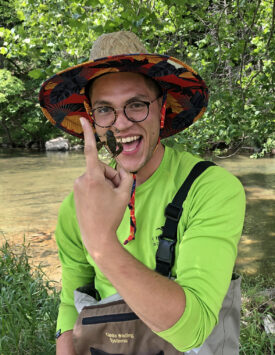Justus joined the Hopkins lab as a post-baccalaureate researcher and technician in November 2021. His research interests are largely in the effects of anthropogenic stressors on freshwater interactions. His research focuses on predator-prey associations between the local crayfish community and eastern hellbender density and reproduction as well as how this relationship may vary with reduced forest cover.
He completed his B.Sc. in Biology with a concentration in Environmental, Ecology, and Evolutionary biology at Appalachian State University. At ASU, he assisted several lab and graduate projects studying competition between plethodontid salamanders, sampling techniques for stream salamanders, and mark and recapture of state threatened salamanders. He also began experiments with larval amphibians observing plasticity in response to predator induced kairomones and pond drying before the COVID-19 pandemic would bring his independent research to a halt.
After completing his undergraduate studies, Justus worked as a Conservation and Land Management intern for the USFWS of Klamath Falls in Southeastern Oregon. There, he assisted conservation projects with threatened and endangered fish and mussels, habitat assessments, and stream restoration. The largest projects focused on movement of fish through natural barriers, invasive fish removal, tagging of endangered bull trout, and range assessments of the threatened western ridged mussel. While in Oregon Justus also experienced the harsh effects of extreme drought, wildfire, and poor riparian management tied directly to human activities.
These experiences were most helpful in inspiring his future ambitions in the quality of freshwater systems.

